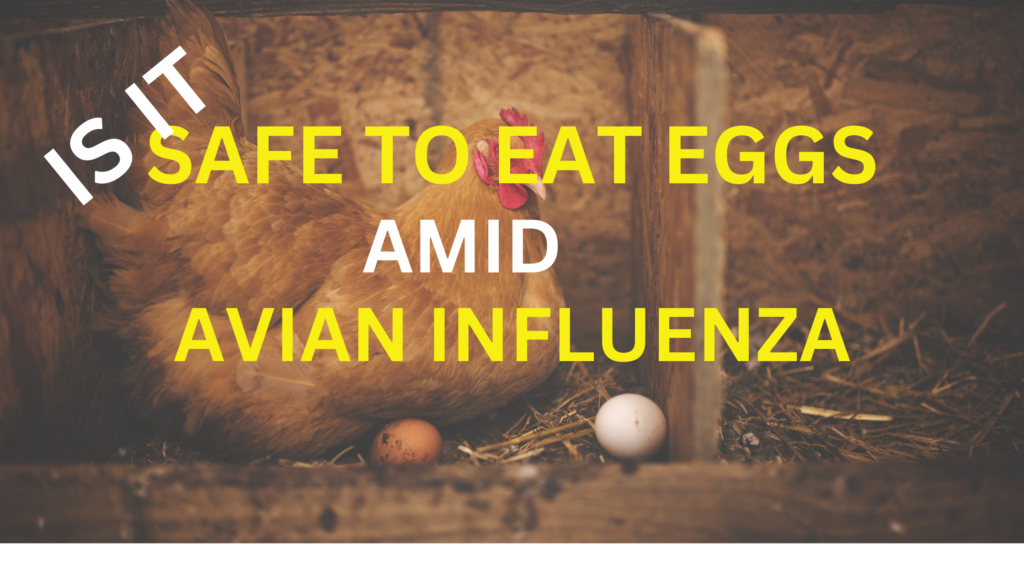Table of Contents
ToggleAvian Influenza and Egg Safety: What You Need to Know
Avian influenza, commonly known as bird flu, is a viral disease that primarily affects birds but can occasionally spread to humans and other animals. It is caused by influenza A viruses, which circulate in wild aquatic birds and can spread to domestic poultry and other bird species. In rare cases, these viruses cross species barriers and infect humans, raising significant public health concerns.
Common Strains of Bird Flu
- Low Pathogenic Avian Influenza (LPAI):
- Causes mild symptoms in birds and rarely poses a risk to humans.
- Highly Pathogenic Avian Influenza (HPAI):
- More severe and often fatal to birds.
- Strains like H5N1 and H7N9 have caused human infections.
Symptoms in Humans
Human infections can range from mild to severe and may include:
- Fever
- Cough
- Sore throat
- Muscle aches
- Eye infections (conjunctivitis)
- Severe respiratory illnesses like pneumonia
In rare cases, avian influenza can lead to complications such as acute respiratory distress syndrome (ARDS) or even death.
Transmission of Avian Influenza
The virus primarily spreads to humans through:
- Direct contact with infected birds (alive or dead)
- Contaminated environments, such as bird droppings
- Infected poultry products, including improperly cooked meat or eggs
Human-to-human transmission is rare but has occurred in limited instances.
Egg Safety During Avian Influenza
Eating eggs from birds infected with avian influenza is not safe unless thoroughly cooked. Cooking eggs at 160°F (71°C) destroys the avian influenza virus, making properly cooked eggs safe to eat. According to the U.S. Food and Drug Administration (FDA), there is no evidence of avian flu infections from consuming properly cooked eggs.
How to Safely Consume Eggs
- Proper Cooking:
- Cook eggs until both the yolk and white are firm.
- Ensure that the internal temperature of eggs reaches at least 165°F (74°C) when preparing dishes like casseroles or baked goods.
- Avoid Raw Eggs:
- Do not consume raw or undercooked eggs, especially in foods like mayonnaise, hollandaise sauce or raw cookie dough, unless made with pasteurized eggs.
- Handling Eggs Safely:
- Wash hands thoroughly after handling eggs or egg cartons.
- Disinfect surfaces and utensils that come into contact with raw eggs.
- Store eggs in the refrigerator at or below 40°F (4°C) to minimize bacterial growth.
- Prevent Cross-Contamination:
- Keep raw eggs and their shells away from ready-to-eat foods.
- Dispose of cracked or dirty eggs.
Prevention and Recommendations
For the general public:
- Avoid contact with wild birds or contaminated surfaces.
- Cook eggs and poultry thoroughly to kill the virus.
- Get seasonal flu vaccinations, which can help reduce the risk of co-infection.
For poultry workers and farmers:
- Wear protective equipment when handling birds.
- Practice strict biosecurity measures to prevent virus spread.
The Role of the Rapid Influenza Diagnostic Test (RIDT)
The Rapid Influenza Diagnostic Test (RIDT) is a quick diagnostic tool used to detect influenza A and B viruses. Results are available in 10–15 minutes, which aids in rapid decision-making for early diagnosis and antiviral treatment. However, RIDTs have lower sensitivity than molecular tests like PCR, meaning false negatives are possible.
Recommendations:
- If a RIDT result is negative but flu is still suspected, healthcare providers may confirm with a molecular test.
- RIDTs are most effective during peak flu season, when the prevalence of the virus is high.
Public Health Considerations
In cases of avian influenza outbreaks, health authorities may call infected flocks to limit the spread of the virus. Poultry and egg products from affected farms are typically removed from the food supply chain to reduce risks to public health. Strict surveillance and rapid containment measures are essential to prevent large-scale outbreaks.
Conclusion
By adhering to FDA guidelines for egg safety and following recommended handling, cooking, and storage practices, the public can safely enjoy eggs during avian influenza outbreaks. With proper precautions and rapid diagnostic tools like RIDT, the risk of avian influenza infections can be effectively managed.
Check out our latest insights:-
Revolutionary “Game-Changer” Anti-Smoking Pill by NHS to Help 85,000 Kick the Habit
Trump Picks RFK Jr. for Health Role – Bold Move Shocks Pharma



